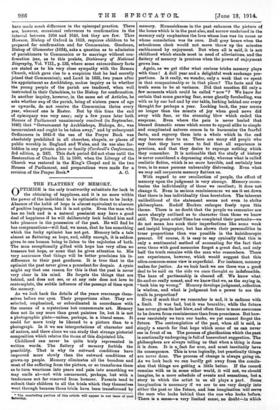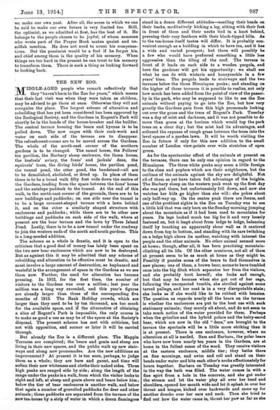THE FLATTERY OF MEMORY.
OPTIMISM is the only trustworthy substitute for luck in the obtaining of happiness, and it is no more within the power of the individual to be optimistic than to be lucky. Absence of the habit of hope is almost equivalent to absence of positive happiness, but it is not quite. Even the man who has no luck and is a natural pessimist may have a good deal of happiness if he will deliberately look behind him and take pleasure in the possession of the past He will find he has compensations—will find, we mean, that he has something which the lucky optimist has not got. Memory tells a tale almost as flattering as hope, and, oddly enough, it is seldom given to one human being to listen to the cajoleriea of both. The man exceptionally gifted with hope has very often no treasure but hope, or none that he gives attention to. His very assurance that things will be better proclaims his in- difference to their past goodness. It is true that to the optimist the past never gives a precedent for despair. A cynic might say that one reason for this is that the past M never very clear in his mind. He forgets the things that are behind, and does not see, or at any rate does not love to contemplate, the subtle influence of the passage of time upon the memory.
As we look back the details of the years rearrange them- selves before our eyes. Their proportions alter. They are selected, emphasized, or subordinated in accordance with the canons of a mysterious but consummate art. Memory does not lie any more than great painters lie, but it is not a photographic plate—unless, perhaps, in a literal sense. It could fur more truly be likened to a picture than to a photograph. In it we see interpretations of character and of nature, and there alone we can study that strange pictorial composition which relates the items of this disjointed life.
Childhood can never be quite truly represented in written words. The flattery of memory forbids the possibility. That is why its outward conditions have improved more slowly than the outward conditions of grown-up people. Memory eliminates all the boredom and most of the suffering from the picture, or so transforms them as to turn weariness into peace and pain into something we may smile at—not with amusement, perhaps, but with a tenderness not far removed from humour. Parents tend to submit their children to all the trials which they themselves went through because those trials have been transformed by
• The ooucluding portion of this esticle will appear in our issue of neat Eatarday. memory. Homesickness in the past enhances the picture of the home which is in the past also, and sorrow enshrined in the memory only emphasizes the love whose loss was its cause or whose consolation was its cure. Dull grey hours when the schoolroom clock would not move throw up the minutes emblazoned by enjoyment. But when all is said, it is not childhood which stands most in need of alleviations, and the flattery of memory is precious when the power of enjoyment grows less.
Again, as we get older what curious tricks memory plays with time! A dull year and a delightful week exchange pro- portions. Is it really, we wonder, only a week that we spent in that companionship or in that place? The facts and the truth seem to be at variance. Did that emotion fill only a few momenta which could be called "now "P We know for certain that some gnawing fear, some ghastly foreboding, was with us by our bed and by our table, lurking behind our every thought for perhaps a year. Looking back, the year seems no longer than the minute of joy when good news did away with fear, or the stunning blow which ended the suspense. Even where the pain is never healed that blessed dramatic sense which seems to appeal alike to simple and complicated natures comes in to harmonize the fearful facts, and regroup them into a whole which in the end may become dear to us. There are many old people who say that they have come to feel that all experience is precious, and that they desire to expunge nothing which they remember. It is noticeable that the study of history is never considered a depressing study, whereas what is called realistic fiction, which is no more horrible, and certainly leas true, is to some persons unbearably distressing. Even what we may call corporate memory flatters us.
With regard to our recollection of people, the effect of memory upon the judgment is very strange. Memory accen- tuates the individuality of those we recollect; it does not change it. Even in serious reminiscences we see it set down that there is less individuality than heretofore. The inherent unlikelihood of the statement seems not even to strike philosophers. Rudolf Eucken enlarges freely upon this theme. There is no doubt that the people we remember are more sharply outlined as to character than those we know still. The great artist Time has completed, their portraits—we do not mean has sunk their imperfections like some weak and insipid biographer, but has shown their personalities in truer proportions than was possible in the kaleidoscopic present. Of course, it is easy to say cynically that this is only a sentimental method of accounting for the fact that even those with good memories forget a great deal, and only half the truth remains with the man who remembers. There are experiences, however, which would suggest that this ultra-common-sense view is superficial. For instance, memory makes for justice. As we look back we see there was a good deal to be said on the side we once thought so indefensible. The haze of partisanship is cleared off. We know what So-and-so really meant, and we know that we, as the saying is, "took him up wrong." Memory develops judgment, reflection is wisdom, and what is judgment but a power to see the truth in proportion?
Even if much that we remember is sad, it is sadness with a limit. It was bad, but it was bearable; while the future has never given its last blow, and often there is more assurance to be drawn from reminiscence than from prescience. But how- ever resolutely we turn our backs, we yet cannot forget the future. The contemplation of the past, when all M said, is simply a search for that hope which some of us can never see in front of us. The process of glorification which the past is continually undergoing is full of benevolent suggestion. The philosophers are always telling us that when a thing is done it is done. It is Meet for ever, and must inevitably have its consequence. This is true logically, but practically things are never done. The process of change is always going on, As we look back we can hardly get away from the conclu- sion that things are getting a little better. If the record remains with us in some other world, it will not, we should imagine, be a mere schedule of events and sensations, but a story in which the artist in us all plays a part. Some imagination is necessary if we are to see very deeply into either the past or the future, and less imagination will serve the man who looks behind than the one who looks before. There is a sense—a very limited sense, no doubt—in which
we make our own past. After all, the sense in which we can be said to make our own future is very limited too. Still, the optimist, as we admitted at first, has the best of it. He belongs to the people chosen to be joyful, of whom someone who wrote part of the Prayer Book makes quaint and un. selfish mention. He does not need to count his compensa- tions. But the pessimist would be a fool if he forgot his, and chief among them is the quality of his memory. When things are too hard in the present he can trust to hi memory to transform them. There is such a thing as looking forward to looking back.











































 Previous page
Previous page